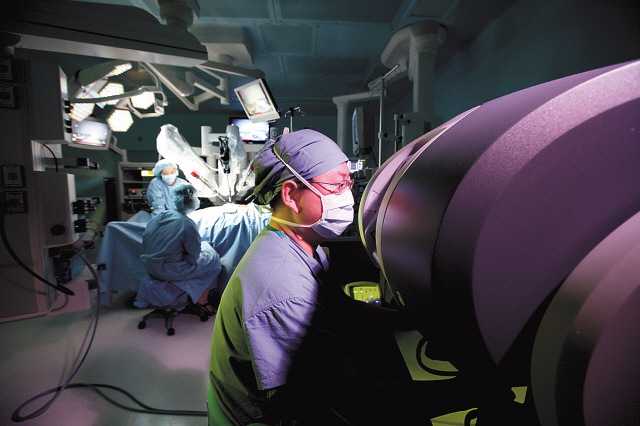Samsung Medical Center, one of the top hospitals in Korea, has expanded its cancer center to offer customized services to patients with world-class medical techniques and equipment.
The newly launched Comprehensive Cancer Center aims to offer surgeries to patients diagnosed with cancers within a week of diagnosis through an integrated service system.
“We will promote Samsung Comprehensive Cancer Center as one of the world’s top five hospitals for cancer care and research,” said SMC head Song Jae-hoon. Song has named Shim Young-mok, a renowned surgeon, to lead the center.
 |
A surgeon performs robot-assisted surgery at Samsung Comprehensive Cancer Center in Seoul. (SMC) |
The hospital, through its clinical research unit, hopes to genetically identify cancers to develop more-targeted drugs. To expand its genomic research for cancer treatment, the medical center has established a strategic partnership with the Broad Institute, an U.S.-based biomedical research center.
SMC also plans to procure the cutting-edge proton beam therapy, the latest version of radiotherapy for cancer. Proton beam therapy uses a high-energy beam of particles to destroy cancer cells. The method is expected to effectively treat currently incurable cancer types such as ocular, brain and spinal cancers, the hospital said.
The center will also minimize surgical incisions made during operations by utilizing robotic surgery, it added.
To reach its goal of becoming a world-class cancer care center, the hospital has also appointed three international medical experts to its advisory committee. The three are Richard Klausner, former director of the National Cancer Institute and former executive director for Global Health of the Bill and Melinda Gates Foundation; Eric Lander, founding director of the Broad Institute; and William Hann, oncology professor at Harvard Medical School.
A healing program will be offered to help cancer patients both physically and psychologically even after treatments are completed, Shim said. The program will have a team of doctors, social workers, clinicians, nurses and nutritionists to support patients as they complete intensive cancer-treatment courses.
By Cho Chung-un (
christory@heraldcorp.com)








![[Today’s K-pop] Blackpink’s Jennie, Lisa invited to Coachella as solo acts](http://res.heraldm.com/phpwas/restmb_idxmake.php?idx=644&simg=/content/image/2024/11/21/20241121050099_0.jpg)